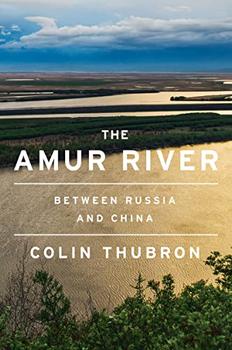Summary | Excerpt | Reviews | Beyond the Book | Readalikes | Genres & Themes | Author Bio

Between Russia and China
by Colin Thubron
The day breaks in. The horses glisten and champ at their tethering trees. Mongo and Ganpurev sing low, tuneless songs to themselves as they heave our baggage over the wooden saddles and brace their feet against the horses' flanks to pull the cords tighter. We set off without knowing where this will end. Almost at once we are in swamp again. Clouds of black flies and mosquitoes follow us. We make for higher ground, but the unbroken packhorse runs wild, spreading its fear to the others, who scatter along the hillside. We lose more hours retrieving our thrown-off baggage, and come to rest in a copse where Mongo tries to subdue the maverick horse. When it rears against him, the two men take up heavy branches and bring them crashing down on its neck and shoulders. Their shouts and blows only incense it, and it breaks free again. These tough, patient animals, it seems, are broken by violence – a sheer test of wills – and I now understand the dents and scars on my White Horse's neck. Batmonkh remonstrates with the men, but they only reply that this is how they've always done it. And when the horses become old, they say, 'they're quite good to eat.'
*
This may be the nadir of our journey, I thought. I no longer recognized myself. I knew I was weakening. Sometimes one of the horsemen steadied me into the saddle, and I dismounted by swinging one leg over the horse's neck, to save my ribs. Small things – shaving, brushing teeth – became an ordeal. I gave up searching my body for ticks or snatching at the mosquitoes that whined in my tent's dark. My appetite had gone. Batmonkh, one evening, said sadly: 'Don't you like my cooking?' But I had only a raging thirst. Sometimes I caught the horsemen looking at me and I thought I could read their minds: How long can he last? By now even they were reduced. The rioting of the packhorses over the marshes had grown unremitting. At night it was Batmonkh, not I, who set up my tent, and the horsemen no longer talked around our fire but retreated to sleep, exhausted, with their boots still on. As for me, I lay fully clothed on my tent's thin mattress, glad of the tiredness that overcame all hurt.
Batmonkh would sit on alone beside the fire, thinking. He seemed, in the end, the hardiest of us. It was too late to go back, he agreed, even if we'd wanted to. A better rider than me, he'd been thrown from his horse that morning while the horsemen laughed at him – but recovered unscathed. He kept a boyish pride in our endeavour. 'This is the hardest journey I've ever done,' he said. 'In ten years' time I'll still be telling people about it.' Yet we would be on horseback for barely more than a week, covering only two hundred miles. It was the peat bogs that reduced us, the sopping underworld which forced our detours and submerged and panicked our horses.
But then came a morning when we realized that something was changing. The hills grew balder, stonier. The bleached swamplands thinned away. Suddenly we were trotting along tracks of pulverized sandstone, and around us the grasslands of the steppe were returning. Soon the hills subsided to slopes where orange and grey bluffs burst up in isolation, and buzzards were circling the sky on frayed wings. And now the steppeland flora lapped round us in its remembered glory. Asters, sweet vetch, gentians, and purple and red clover were whirring with wasps and flies, and tiny marbled butterflies careering above. Soon red admirals and painted ladies appeared, and fast-flying tortoiseshells with many others I did not know, and wagtails were shrilling by the river. A weathered noticeboard told us that we were leaving the Strictly Protected Area. Signs of habitation emerged: broken-down corrals, abandoned paddocks, some stray cattle. A solitary farmer, reaping hay, barely turned to look at us. And at the day's end the jeep that had carried us to the edge of this region – a Ukrainian UAZ with its imperturbable driver – had circled round three hundred miles to meet us on the track.
Excerpted from The Amur River by Colin Thubron. Copyright © 2021 by Colin Thubron. Excerpted by permission of Harper. All rights reserved. No part of this excerpt may be reproduced or reprinted without permission in writing from the publisher.
A classic is a book that has never finished saying what it has to say
Click Here to find out who said this, as well as discovering other famous literary quotes!
Your guide toexceptional books
BookBrowse seeks out and recommends the best in contemporary fiction and nonfiction—books that not only engage and entertain but also deepen our understanding of ourselves and the world around us.